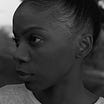I Have Looked at This Scene Several Times
Rhoda Tchokokam on 3 photographs from the Tender Photo archive
I have looked at this scene several times: two people walking nonchalantly along the beach under the midday sun, prolonging their conversation until they have nothing more to say, until the endless coastline gets the better of their desire not to leave each other. One of them is holding a bottle of water, which will help to endure the heat and the other, what seems like a tissue.
The photograph, washed out by underexposure and the low ISO film chosen, resembles a memory: “I saw two men on the beach”. We no longer remember if there were other people there, we no longer know precisely what color the sky had taken on, we no longer even know where the men came from. We just know they were there. The main detail we distinctly remember with a smirk is “Big Man,” the name on the boxer shorts of the shorter man.
A bloody man left for dead, another who seems to indicate the place to avoid, two large stones, an iron bar, a wheel, a road marked by the trace of a blaze. Even though the indifference of the drivers present could say the opposite, a tragedy has occurred. However, when you were raised in an urban African city, the picture is sadly ordinary and its potential justification is widely tolerated. It reminds me of the many times I witnessed the same scene in Douala, in the back seat of my mother's car. Regardless of the act committed by the individual judged as a thief, the punishment was the same. Popular justice, the dictatorship of the people, the right to kill. In Cameroonian pidgin, we say “You chercha, you trouva, you trouva, you supporta,” (“you brought it upon yourself”) as a way to disguise our detachment. Unable to imagine the phrase could later be used against us.
I have never shared the photographs I have taken of my partners. In front of this one, I thought of what I never dared to do, for fear of saying and showing too much, of desacralizing the private, of exposing without knowing how to protect. I want to believe that the author faced similar interrogations. We are authorized to get very close under certain conditions. We see the face of the woman, half of it, and what the light allows us to see. The other half of the room is concealed in sheets and darkness. In order to share his intimacy, the photographer made sure to create a frame within the frame. But what we see is enough to reassure: the comfort of being in front of a camera she already knows.
1–3: Photographs by Kwena Chokoe, Aghogho Otega, and KC Nwakolor
About Rhoda Tchokokam
Rhoda Tchokokam (
) is a writer, critic and photographer based in Paris, whose work is rooted in remembrance, preservation and black transnationalism. She’s the founder of the visual project Atoubaa. She co-wrote “le dérangeur:petit lexique en voie de décolonisation,“ (The disturber: a short lexicon in the process of decolonizing itself) and her first book on R&B culture and expression in France and the Antilles is set to be published in 2023. See more on her website, and Instagram.Support Tender Photo
This is the #4 edition of Correspondences, a pop-up series on Tender Photo, published every Saturday from March 4–May 20, 2023. I asked a few writers to find “correspondences” between 3 photographs from the archive, chosen without constraint on style or genre, and to write short commentaries on their choice. The goal is to open up Tender Photo’s editorial and curatorial process to an engaged group of readers, broadening the diversity of responses to the varied work featured so far.
Tender Photo is a bi-weekly newsletter on African photography, published Wednesdays and Saturdays. See the archive for more features on early to mid-career photographers. If this newsletter was shared with you, consider subscribing, or forward to a friend. Please whitelist the newsletter to ensure you never miss it.







